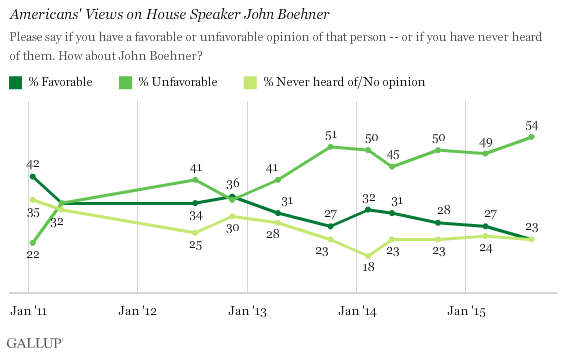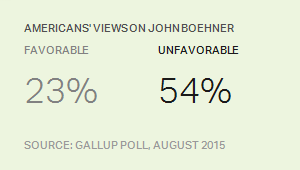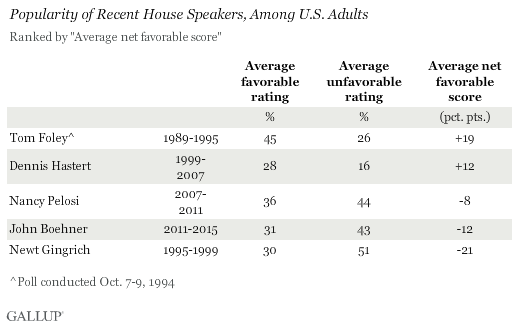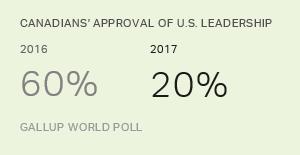WASHINGTON, D.C. -- House Speaker John Boehner shocked Washington on Friday when he unexpectedly announced his retirement, but judging by his national favorable ratings, his presence likely won't be missed by most Americans. In August, about a quarter of Americans (23%) said they have a favorable view of the House speaker, his lowest Gallup rating as the lower chamber's top lawmaker. A majority of U.S. adults (54%) view him unfavorably, while 23% have no opinion. Since late 2013, close to half or more of Americans have viewed Boehner unfavorably.

Boehner took over the speaker's gavel in early 2011, following the 2010 electoral "thumping" that thinned the once-formidable numbers of House Democrats. Though a longtime member of Congress and indeed the Republican leader in the House since 2007, Boehner was not known to about a third of the country when he began his speakership in 2011. But among those who knew of him, about twice as many Americans rated him favorably (42%) as unfavorably (22%).

This was the peak of his popularity. House Republicans repeatedly clashed with the Democratic White House and Senate over a series of issues related to the nation's budgetary or fiscal position. Each confrontation carried enormous stakes when a compromise was not found -- such as in late 2011, when the U.S. nearly defaulted on its debt because of congressional reticence to extend the nation's debt ceiling that authorizes federal borrowing. This crisis led to the creation of a government "supercommittee." The supercommittee, stacked with legislative heavy-hitters, was supposed to recommend large budgetary cuts or else trigger a series of broad budget cuts known as "sequestration," designed to be so onerous that the supercommittee would be forced to come to some agreement if only to prevent such an outcome. But the supercommittee failed, and sequestration was enacted. These budget cuts remain controversial to this day.
The next big partisan battle occurred in late 2012, as the House and Barack Obama faced off on how best to resolve the impasse known as "the fiscal cliff." This referred to the deadline for renewing Bush-era tax cuts before they expired at the end of the year, costing taxpayers $500 billion. And although it was eventually resolved, the high-stakes drama probably did not help Boehner's standing with Americans. His favorable rating dropped to 31% in April 2013, several months after the deal was concluded.
Perhaps the most memorable moment of Boehner's speakership came later in 2013, when another budgetary disagreement between Congress and the president led to a brief government shutdown. Gallup found that, generally speaking, Americans saw Republicans as more at fault for the episode -- the GOP received its lowest-ever favorable rating during the standoff. Boehner's favorable rating also slid to 27% in October that year. But once a deal was reached that reopened the government, the political atmosphere quickly changed to one of deep dissatisfaction with President Obama and Democrats, leading to the 2014 Republican rout that gave the GOP control of the Senate. Boehner saw the Republican majority grow to the highest levels seen since the 1920s. It seemed like the 2015-2016 Congress would be the pinnacle of Boehner's influence and leverage on Capitol Hill.
But nine months in, Boehner -- with a now-underwater net favorable rating among Republicans -- is instead resigning. Of the last five House speakers, Boehner and Newt Gingrich are the only two to resign the post rather than see it swept away by the electoral tides. Interestingly, when looking at the average favorable and unfavorable ratings for the last five speakers, both men finish at the bottom of the pack in terms of popularity. Boehner ends his term with an average favorable rating of 31% and an unfavorable rating of 43%, for a net favorable score of -12. Only Gingrich had a worse net favorable score. His consequential, if rocky, speakership earned an overall net favorable rating of -21, with an average 30% rating him favorably and 51% unfavorably.

National popularity, however, does not necessarily afford job security to the House leader in the same way it might for a president. Democratic House Speaker Tom Foley is a case in point. In October 1994, on the eve of a midterm election, Foley fared fairly well with the public -- 45% liked him, 26% didn't, and his resulting net favorable of +19 remains the highest for any House speaker Gallup has on record. All of this was immaterial as the Republican wave of 1994 crashed on the Democratic House, costing Foley not only the speakership but his actual seat in Congress. Foley became the first House speaker since the Civil War to fail to win re-election to the chamber.
Dennis Hastert, the longest-serving Republican speaker in U.S. history, finished his term in 2007 with a +12 favorable rating, but his party had lost the majority in the 2006 elections, likely prompting his exit from Congress soon thereafter. Nancy Pelosi, who still serves in the House as the minority leader, had an average favorable rating of 36% and an unfavorable rating of 44% over her term spanning 2007-2011. Her deep unpopularity in the runup to the 2010 elections played a part in the breadth and depth of her party's defeat at the ballot box that year.
Lastly, Boehner is one of four current congressional leaders -- with Pelosi, Senate Minority Leader Harry Reid and Senate Majority Leader Mitch McConnell -- who have served as leaders in their respective caucuses concurrently since 2007. Despite their many years on the national stage, they remain either unknown or disliked by most Americans. And on their watch, Congress has seen its approval rating slump to historic lows and fail to make any significant rebound. To this point, in August, Congress' job approval rating was at 14%, not much higher than its all-time low of 9% in November 2013. It's not clear, of course, to what extent these leaders contribute to Congress' overall unpopularity, but their presence has seemed to do nothing to stop this trend.
